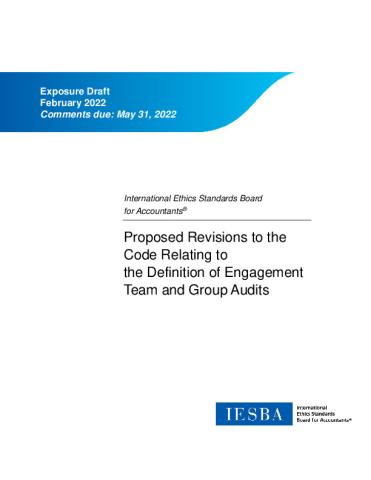Proposed Revisions to the Code Relating to the Definition of Engagement Team and Group Audits
The proposed revisions to the International Code of Ethics for Professional Accountants (including International Independence Standards) (the Code) establish provisions that comprehensively address independence considerations for firms and individuals involved in an engagement to perform an audit of group financial statements. The proposals also address the independence implications of the change in the definition of an engagement team―a concept central to an audit of financial statements―in the International Auditing and Assurance Standards Board’s (IAASB) International Standard on Auditing (ISA) 220, Quality Management for an Audit of Financial Statements.
Among other matters, the proposals:
- Establish new defined terms and revise a number of existing terms, including for application with respect to independence in a group audit context.
- Clarify and enhance the independence principles that apply to:
- Individuals involved in a group audit.
- Firms engaged in the group audit, including firms within and outside the group auditor firm’s network.
- More explicitly set out the process to address a breach of an independence provision at a component auditor firm, including reinforcing the need for appropriate communication between the relevant parties and with those charged with governance of the group.
- Align a number of provisions in the Code to conform to changes in the IAASB’s Quality Management standards.
Comments requested by May 31, 2022.
Global-Webinar-Engagement-Team-Group-Audits-Independence (PDF | 2.14 MB)
Submitted Comment Letters
-
European Federation of Accountants and Auditors for SMEs (EFAA) (Europe) (283.18 KB)()
-
Chartered Accountants Ireland (CAI) (391.54 KB)(Ireland)
-
Certified Practising Accountant Australia (CPAA) (1.02 MB)(Australia)
-
New York State Society of CPAs (NYSSCPA) (211.86 KB)(United States of America)
-
IFAC Small and Medium Practices Advisory Group (IFAC SMPAG) (International) (179.91 KB)()
-
Wirtschaftsprüferkammer (WPK) (189.97 KB)(Germany)
-
Pitcher Partners (Pitcher) (669.35 KB)(Australia)
-
International Organization of Securities Commissions (IOSCO) (3.78 MB)()
-
Financial Reporting Council (UKFRC) (167.3 KB)(United Kingdom)
-
MNP LLP (MNP) (151.86 KB)(Canada)
-
Institute of Certified Public Accountants of Uganda (ICPAU) (93.66 KB)(Uganda)
-
Federation of Accounting Professions (TFAC) (232.33 KB)(Thailand)
-
Institute of Singapore Chartered Accountants (ISCA) (152.34 KB)(Singapore)
-
Committee of European Auditing Oversight Bodies (CEOAB) (Europe) (147.11 KB)()
-
Institute of Chartered Accountants in England and Wales (ICAEW) (174.32 KB)(United Kingdom)
-
Instituto dos Auditores Independentes do Brasil (IBRACON) (213.47 KB)(Brazil)
-
Korean Institute of Certified Public Accountants (KICPA) (139.38 KB)(Korea)
-
Hong Kong Institute of Certified Public Accountants (HKICPA) (331.53 KB)(Hong Kong, Special Administrative Region of China)
-
Botswana Institute of Chartered Accountants (BICA) (708.17 KB)(Botswana)
-
Society of Certified Accountants and Auditors of Kosovo (SCAAK) (234.67 KB)(Kosovo)
-
Japan Institute of Certified Public Accountants (JICPA) (190.64 KB)(Japan)
-
Accountancy Europe (AE) (523.62 KB)()
-
Botswana Accountancy Oversight Authority (BAOA) (151.59 KB)(Botswana)
-
BDO International Limited (BDO) (238.7 KB)()
-
Association of Italian Audit Firms (ASSIREVI) (215.94 KB)(Italy)
-
PKF International Limited (PKFI) (204.32 KB)()
-
South African Institute Of Professional Accountants (SAIPA) (243.04 KB)(South Africa)
-
Independent Regulatory Board for Auditors (IRBA) (307.12 KB)(South Africa)
-
National Association of State Boards of Accountancy (NASBA) (228.02 KB)(United States of America)
-
KPMG IFRG Limited (KPMG) (International) (200.83 KB)()
-
Independent Regulatory Board for Auditors (IRBA) (307.12 KB)(South Africa)
-
Institute of Chartered Accountants of Scotland (ICAS) (731.89 KB)(United Kingdom)
-
Deloitte Touche Tohmatsu Limited (DTTL) (International) (761.44 KB)()
-
Joint Submission by Chartered Accountants Australia and New Zealand and the Association of Chartered Certified Accountants (ACCA&CAANZ) (International) (179.16 KB)()
-
Mazars Group (MAZARS) (International) (1.22 MB)()
-
Chartered Professional Accountants Canada Public Trust Committee (CPAC) (302.17 KB)(Canada)
-
Pricewaterhousecoopers International (PWC) (213.93 KB)()
-
Argentine Federation of Professional Councils of Economic Sciences (FACPCE) (122.1 KB)(Argentina)
-
Federación Argentina de Consejos Profesionales de Ciencias Económicas (122.1 KB)(Argentina)
-
New Zealand Auditing & Assurance Standard Board (NZAuASB) (591.28 KB)(New Zealand)
-
Ernst & Young Global Limited (EY) (International) (32.84 KB)()
-
Institut der Wirtschaftspruefer in Deutschland e.V. (IDW) (185.02 KB)(Germany)
-
United States Government Accountability Office (GAO) (157.99 KB)(United States of America)
-
International Forum of Independent Audit Regulators (IFIAR) (123.16 KB)()
-
Accounting Professional & Ethical Standards Board (APESB) (227.52 KB)(Australia)
-
South African Institute of Chartered Accountants (SAICA) (314.77 KB)(South Africa)
-
Compagnie Nationale des Commissaires aux Comptes (CNCC) (226.39 KB)(France)
-
Grant Thornton International Ltd. (GTIL) (227.16 KB)()
-
Royal Netherlands Institute of Chartered Accountants (NBA) (103.32 KB)(Netherlands)
-
Malaysian Institute of Accountants (MIA) (220.1 KB)(Malaysia)

